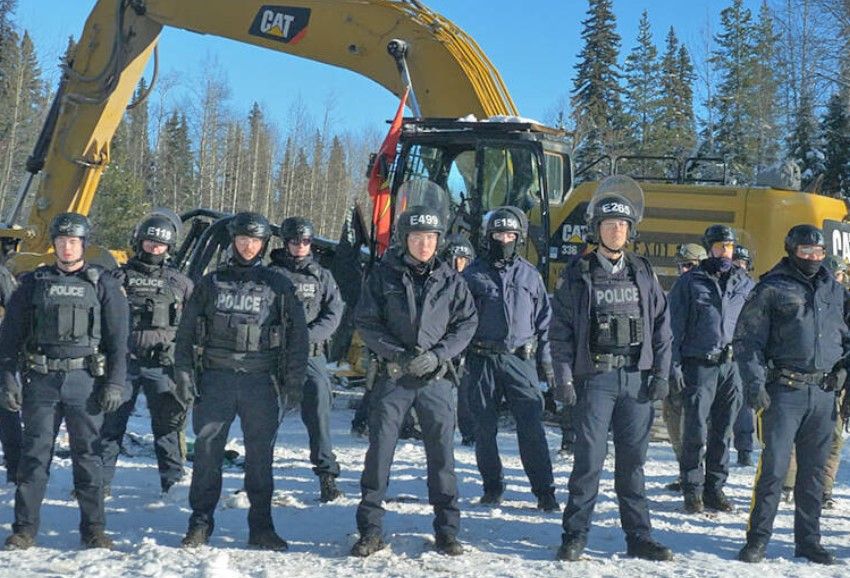
While Mark Carney has laid out plans to reduce departmental spending by 15 per cent across the board, some departments are getting massive increases. Military spending will be increased to levels not seen since WWII, an extra billion will be spent on border control, and now Carney has announced he will be increasing funding to the RCMP to the tune of $1.8 billion.
The increased spending will be used to hire 1,000 new RCMP personnel and increase the cadet allowance by $1,000 a week. Connected to this, Bill C-14—or the Bail and Sentencing Reform Act—will change the criminal code to make it harder for some people to receive bail.
The consistent message from the government has been that the goal of all this is, in the words of Carney, to “keep violent and repeat offenders out of our communities.” This represents another reversal from the Trudeau government who had argued against similar proposals made by the Conservatives. With 79 per cent of Canadians believing that we will see an increase in violent crime in the future, Carney is trying to appeal to the fears many Canadians have, and conceal his actual aim: to strengthen the state.
This bill has nothing to do with combatting “violent crime” and everything to do with preparing the state for the social explosions which are sure to come as a result of the decay of the system. There is no evidence that harsher bail rules reduce crime. Moreover, violent crime went down by one per cent last year; and many of the specific crimes Bill C-14 targets, like auto theft, violent assault, and sexual assault, have decreased too.
The bill also claims to target what the Liberals call “organized retail theft”—a phenomenon for which there is no evidence. And while retailers repeat a dishonestly inflated number of $9 billion in goods stolen last year, if there is really a rise in shoplifting, the cause is years of high inflation, declining real wages, and rising unemployment, which have left Canadians unable to afford basic necessities like groceries.
In other words, shoplifting is a result of the crisis of the Canadian economy. We are witnessing mass layoffs in certain sectors, rising unemployment—especially for youth, whose unemployment rate has hit 20 per cent in some areas—and a generalized cost of living crisis. There were 2.2 million visits to food banks across the country in March 2025 alone, and more than half of people in Canada live paycheque to paycheque.
Carney knows this. He knows that harsher bail doesn’t work to fight violent crime. And if he really wanted to stop shoplifting, he would not be intensifying poverty by adopting austerity—while raising military spending, police spending, and gifting billions to corporations. “Tough on crime” rhetoric is just a smokescreen for his real motivation.
A 2024 RCMP report warned that deteriorating living conditions and societal decline will lead to social unrest. It even raised the spectre of revolution. This prediction is even more pertinent now. The crisis deepened this year, and Carney’s cuts will enhance people’s misery and fuel working-class rage. This will eventually force workers to fight.
A possible flashpoint is the Indigenous struggle. Carney wants to develop Canada’s critical mineral deposits. Mining requires encroachment on Indigenous land, which will undoubtedly provoke resistance. Mining and refining these minerals is also very environmentally destructive, which could inflame the environmental movement.
Mass class battles are therefore coming. This reveals the real meaning of Bill C-14 and the increase in RCMP funding. The RCMP will no doubt be used to try to crush any Indigenous resistance, as was the case with the Wet’suwet’en resistance to the Trans-Mountain pipeline in 2018. The bill’s Criminal Code changes will mean that any protester accused of assault by the police will immediately be jailed, with little prospect of receiving bail while they await trial. Far from trying to help working-class people, Carney is preparing to crush them by sharpening the government’s tools of repression.
This is just one more nail in the coffin of the idea that Canada is some peaceful liberal paradise. Carney is giving the government the tools to crack down on the working class in order to push through whatever measures the bourgeoisie and their system demand: from mining permits on Indigenous land to attacks on healthcare and education.
This is what capitalism offers today: economic catastrophe, massive cuts to social services, and billions for police repression—to be used against those fighting for a better future.
But, no matter how much he tries, Carney can not stop the struggles that lie ahead. Workers will not peacefully sit by while they watch all of the gains they have won disappear in front of them. Great class battles are coming. The ruling class is preparing, and we must too. If it is conscious and organized, the working class has the power to defeat any attacks from police and the system behind them—no matter how much money Carney spends to stop them.

